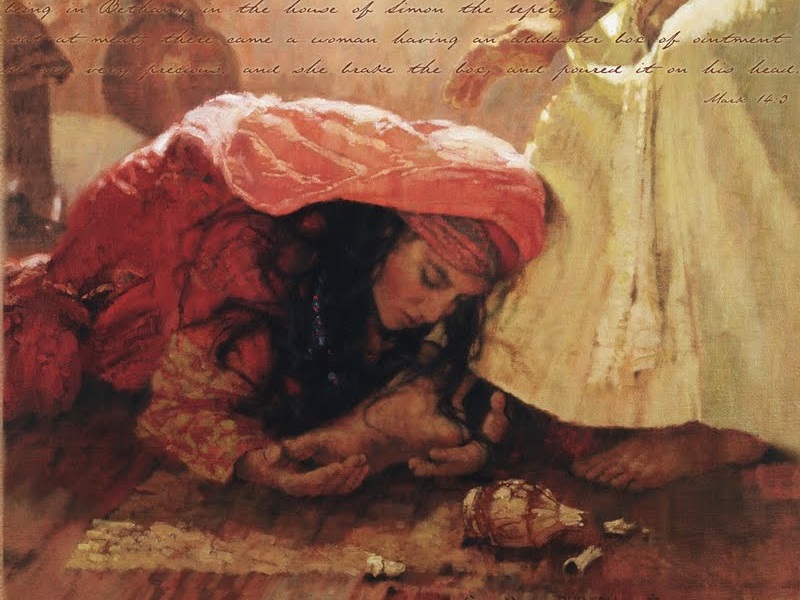In John 12 Mary of Bethany interrupts the dinner party given in Jesus’ honor at Simon’s house to anoint his head and feet with pure nard. This perfumed resin cost a year’s wage. Mary broke the neck of the bottle containing the nard so that it could not be saved (Mark 14.3). The entire house was filled with the fragrance of it. In order to work the perfumed oil into Jesus feet, and to remove the excess, Mary wiped Jesus’ feet with her hair. This act was so outrageous, so intimate that it upset the others at the dinner party. Judas openly complained about the waste of money. Jesus defends Mary, explaining that she has anointed Him ahead of time for his burial. He does more than defend her, he celebrates her. He demands that wherever the Gospel is preached Mary, and her kind gesture is to be remembered (Mark 14.7-9).
This gesture is so intimate that we had a hard time staging it for Vacation Bible School last summer. We made sure we got a husband and wife to play Jesus and Mary because we would not ask a woman to wipe a random man’s feet with her hair. We made sure we asked a newly wedded couple because we doubted most married women would agree to wipe their husband’s feet with their hair. Luckily we had a couple who were just married to play the roles of Jesus and Mary. They carried off the scene perfectly. It was startling to behold. Seeing it in person – how shocking this gesture is, and understanding that those first century Jews were closer culturally to fundamentalist Muslims than to us jaded Westerners – emphasized dramatically the radical nature of the moment.
It wasn’t the first time something like this had happened to Jesus. Earlier, at the home of a Pharisee (also named Simon) a prostitute interrupted dinner to weep at Jesus’ feet (Luke 7.36-50). She bathed Jesus’ feet with her tears and wipes them with her hair. Simon, an important Pharisee was insulted at this intrusion, and thought that if Jesus were truly a prophet he would know what kind of woman was taking such liberties. Jesus defended the woman, explaining that she is only showing gratitude for the forgiveness she has been given. He exposed the way Simon has mistreated him, refusing him basic hospitality, and compared that treatment with the radical devotion of this unnamed prostitute.
In both instances we see women bravely breaking society’s rules to express their gratitude and devotion to Jesus. Jesus receives and appreciates these gestures. Jesus is also careful to fully explain the significance of both gestures, and make clear His appreciation of them. He wants to make sure we understand that both women are sincere. Their gestures are as natural as a sunrise. We need to take notice, to learn, to follow.
There is something else. Jesus is wholly unconcerned about our uneasiness. It is almost like He is saying, “This makes you uncomfortable? Well grow up!” If we cannot appreciate the purity and beauty of these women who, for different reasons wiped Jesus’ feet with their hair – even after Jesus carefully explains everything – we are beyond Jesus’ patience. Jesus is not going to accommodate our narrowness. He is not going to hide these gestures, nor ask these ladies to tone their acts of devotion down.
No. Both women are in the Gospel record. God made sure of it. In Mary’s case Jesus says her act of kindness should be part of the preaching of the Gospel wherever the Gospel is preached. We cannot avoid them. Every Gospel has one of these stories. Gratitude and devotion will naturally produce radical, unashamed acts of kindness. When this happens Jesus notices, understands, and is glad.
Do we have a problem with that?
